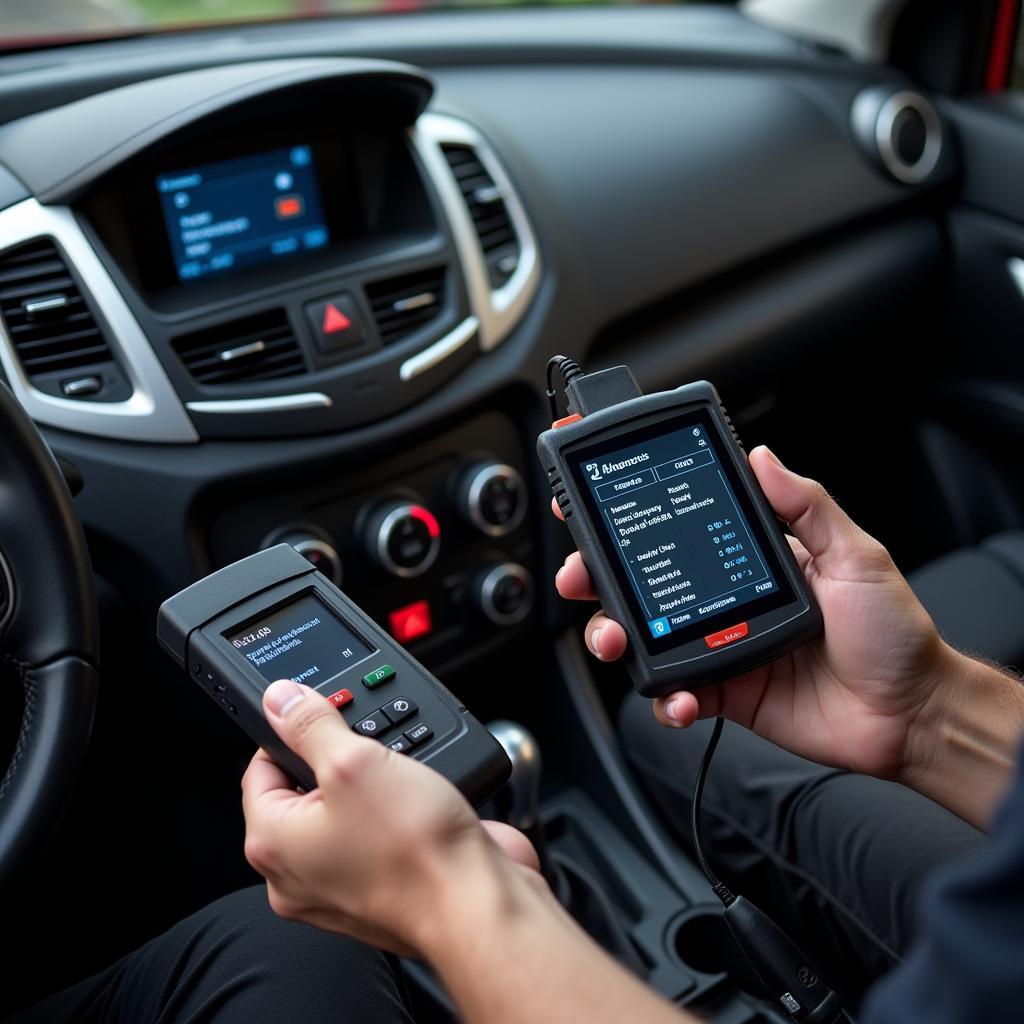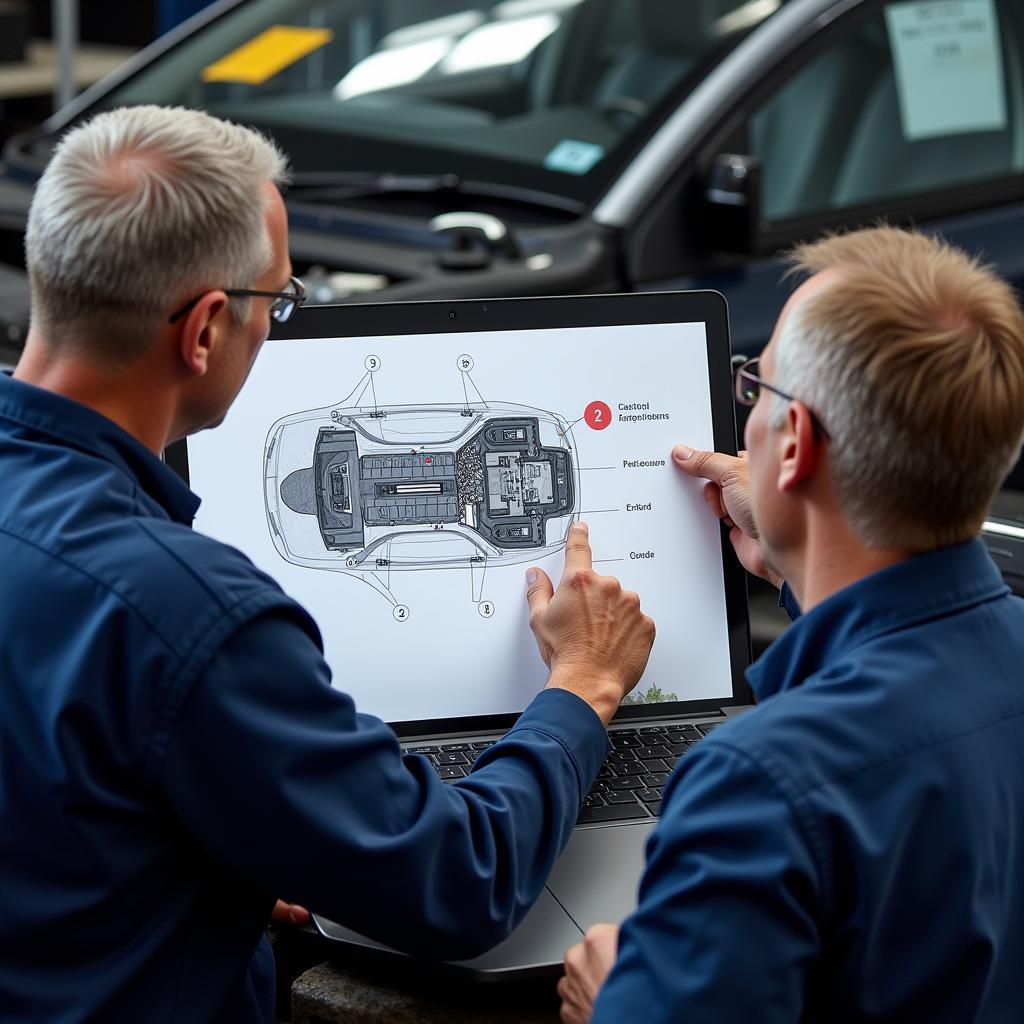A car diagnostic test, also known as a vehicle diagnostic test, is like a health checkup for your car. It involves using a specialized tool, called an OBD2 scanner, to communicate with your vehicle’s computer system and retrieve valuable data about its performance. This data can reveal underlying issues and potential problems, helping mechanics pinpoint the root cause of malfunctions and make accurate repairs.
 Car Diagnostic Test with OBD2 Scanner
Car Diagnostic Test with OBD2 Scanner
Understanding the Importance of Car Diagnostic Tests
In the past, diagnosing car problems often involved a lot of guesswork and time-consuming manual inspections. Mechanics had to rely on their experience and intuition to identify the source of issues, which could sometimes lead to inaccurate diagnoses and unnecessary repairs.
However, with the advent of car diagnostic tests, the process has become significantly more efficient and reliable. By tapping into the vehicle’s onboard computer, these tests can provide a wealth of information about various systems, including:
- Engine: Performance, fuel efficiency, ignition timing, emissions, and more.
- Transmission: Shifting patterns, fluid levels, clutch operation, and other transmission-related data.
- Brakes: Anti-lock braking system (ABS), electronic stability control (ESC), and other brake components.
- Airbags: Deployment status, sensor readings, and overall system integrity.
- Emissions Control: Oxygen sensor readings, catalytic converter efficiency, and other emissions-related parameters.
How Does a Car Diagnostic Test Work?
At the heart of every car diagnostic test lies the OBD2 port, a standardized connector found in most vehicles manufactured after 1996. This port serves as the gateway to the vehicle’s computer system, allowing external devices like OBD2 scanners to access its data.
Here’s a step-by-step breakdown of how a car diagnostic test typically works:
- Connecting the OBD2 Scanner: A mechanic connects the OBD2 scanner to the vehicle’s OBD2 port, usually located under the dashboard on the driver’s side.
- Retrieving Diagnostic Trouble Codes (DTCs): The scanner communicates with the vehicle’s computer and retrieves any stored DTCs. These codes are like digital fingerprints that represent specific malfunctions detected by the system.
- Interpreting DTCs: Mechanics use specialized software or online databases to decipher the meaning of DTCs. Each code corresponds to a particular issue or system malfunction.
- Analyzing Live Data Stream: The OBD2 scanner can also display a live stream of data from various sensors and components, providing real-time insights into the vehicle’s performance.
- Performing Additional Tests (if needed): Based on the DTCs and live data analysis, mechanics may conduct further tests to confirm their diagnosis and identify the root cause of the problem.
“Car diagnostic tests are invaluable tools for mechanics,” says John Smith, a seasoned automotive technician at XYZ Auto Repair. “They provide a starting point for diagnosis, saving us countless hours of troubleshooting and ensuring we address the actual problem, not just the symptoms.”
Benefits of Regular Car Diagnostic Tests
While car diagnostic tests are commonly associated with troubleshooting existing problems, their benefits extend far beyond just fixing malfunctions.
Here are some compelling reasons why you should consider getting regular car diagnostic tests:
- Early Problem Detection: By identifying issues in their early stages, diagnostic tests can help you prevent costly repairs down the line.
- Improved Fuel Efficiency: Addressing engine performance issues identified through diagnostic tests can optimize fuel consumption and save you money on gas.
- Enhanced Safety: Diagnostic tests can detect problems with critical safety systems like brakes, airbags, and stability control, ensuring your vehicle operates safely.
- Increased Resale Value: Regular maintenance documented by diagnostic test reports can enhance the resale value of your car by demonstrating its reliability and good condition.
 Mechanic Explaining Car Diagnostic Test Results to Car Owner
Mechanic Explaining Car Diagnostic Test Results to Car Owner
Conclusion
In the world of modern automobiles, a car diagnostic test is no longer a luxury but a necessity. It’s a powerful tool that empowers car owners and mechanics alike to understand, maintain, and repair vehicles with greater accuracy and efficiency.
By embracing regular car diagnostic tests, you can unlock a world of benefits, from early problem detection and improved fuel efficiency to enhanced safety and increased resale value.
Need help with a car diagnostic test or have other car-related questions? Contact us via WhatsApp: +1(641)206-8880 or Email: [email protected]. Our 24/7 customer support team is here to assist you. You can also find more information in our articles on what is a diagnostic car test and how to do a car diagnostic test.

Leave a Reply